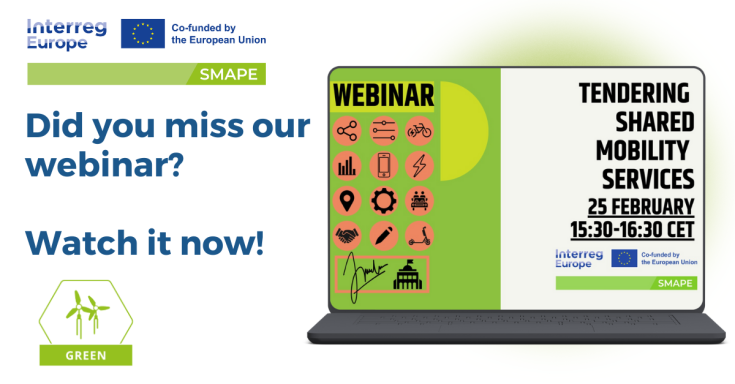SMAPE Webinar Recap: Advancing tendering strategies

On February 25, 2025, the SMAPE project hosted a webinar on tendering shared mobility services, bringing together policymakers, city representatives, and mobility providers to exchange real experiences, case studies and tackle challenges in public procurement for shared mobility.
Balancing rules with real-world Implications
The session opened with Fanny Boccioli, Policy Officer from SMAPE partner POLIS, presenting their upcoming study on the practical implications of shared mobility regulations. Drawing insights from POLIS’s research, Boccioli highlighted that while rules are necessary, badly designed regulations can backfire—leading to inefficiency, poor service quality, and even discouraging shared mobility adoption.
She cited several key examples where overregulation or lack of enforcement created unintended consequences. While speed limits for e-scooters and shared bikes are often discussed, policymakers rarely address the speed and impact of larger, heavier vehicles, creating an uneven regulatory landscape. Helmets appear also as a source of conflict, while they enhance safety, mandatory helmet rules have reduced user uptake, as many people won’t carry a helmet daily for occasional use. Boccioli emphasized that the success of shared mobility depends not just on rules, but on how they are enforced and whether they align with user behaviour and market realities. "Obvious rules aren't always the right rules," she noted. "Regulations should be designed to encourage good practices rather than just reacting to public complaints".
Bremen’s experience to shared mobility tenders
Rebecca Karbaumer from SMAPE lead partner the City of Bremen then provided a real-world example of how smart tendering can build a strong shared mobility ecosystem. Bremen has long been a leader in car-sharing, but the city has also recently launched a new bike-sharing system, structured around an EU-wide tendering process.
Car-Sharing tendering
Bremen’s car-sharing network features over 650 vehicles, with a mix of station-based and free-floating models. The city's tendering process departs from conventional bidding models in several key ways:
- Instead of a strict bidding process, Bremen issues a call for expressions of interest, allowing providers to negotiate service terms and locations.
- Environmental and service quality criteria are prioritized, ensuring car-sharing services reduce car ownership and emissions rather than just adding vehicles.
- Long-term contracts (up to 8 years) provide stability for operators, encouraging investment in vehicle quality and better user services.
By encouraging cooperation rather than aggressive competition, Bremen has created a thriving car-sharing ecosystem where operators align with public mobility goals rather than simply competing for market share.
Bremen’s new bike-sharing system
Bremen is about to launch a new bike-sharing system, Bre-Bike, to expand sustainable transport options. The tendering process was carefully designed to ensure:
-
A balanced mix of standard bikes and cargo bikes, providing greater accessibility for different user needs.
- Integration with Bremen’s "mobil.punkt" mobility hubs, allowing seamless connections between car-sharing, bike-sharing, and public transport.
- A transparent selection process, including a testing phase with diverse users to assess bike quality and user experience.
- A citywide marketing and communication campaign, co-funded by the provider and the city, to encourage uptake and public awareness.
The operator perspective and challenges in tenders
The discussion then turned to Marion Galan Alfonso and Aleksander Lannoy from Donkey Republic,shared micromobility operator. They shed light on the common hurdles faced by operators in public tenders, including:
- Excessively prescriptive requirements that limit service innovation.
- Short contract durations, which make it difficult for companies to recover initial investments.
- High penalties for service disruptions, creating financial risk without considering operational challenges like vandalism or infrastructure failures.
Their recommendation was clear: tenders should focus on desired outcomes rather than rigid specifications, allowing operators to propose the best solutions based on their expertise. They stressed that tenders should reward quality over price, ensuring that operators are selected for their ability to provide a sustainable, user-friendly service, rather than just the lowest bid.
Conclusion
The SMAPE webina hrighlighted the role that well-structured procurement processes play in ensuring sustainable, high-quality, and accessible urban mobility.
The discussion reinforced the need for cities to engage with mobility operators before launching tenders, ensuring that regulations support rather than hinder innovation. Longer contracts, revenue-sharing models, and outcome-driven criteria were highlighted as key elements of a successful tendering process.
